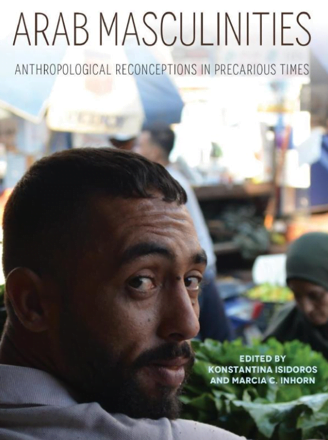Arab Masculinities provides a groundbreaking analysis of Arab men’s lives in the precarious aftermath of the 2011 Arab uprisings. It challenges received wisdoms and entrenched stereotypes about Arab men, offering new understandings of rujula, or masculinity, across the Middle East and North Africa.
The 10 individual chapters of the book foreground the voices and stories of Arab men as they face economic precarity, forced displacement, and new challenges to marriage and family life. Rich in ethnographic details, they illuminate how men develop alternative strategies of affective labor, how they attempt to care for themselves and their families within their local moral worlds, and what it means to be a good son, husband, father, and community member.
Arab Masculinities sheds light on the most private spaces of Arab men’s lives―offering stories that rarely enter the public realm. It is a pioneering volume that reflects the urgent need for new anthropological scholarship on men and masculinities in a changing Middle East.
- Publisher : Indiana University Press (January 4, 2022)
- Language : English
- Hardcover : 246 pages
- ISBN-10 : 0253034787
- ISBN-13 : 978-0253034786
Reviews
“This is an absorbing collective achievement that moves us beyond exhausted truisms about Arab men and patriarchy. With attentiveness each chapter tells us something truly new about how Muslim and Christian Arab men navigate uncertainties as they juggle desires and burdens in their lives. The volume is a valuable resource for teaching the anthropology of gender, sexuality, and family in the Arab world.”
―Nefissa Naguib, University of Oslo.
“A long-overdue and strikingly rich ethnographic insight into the under-researched field of the emerging challenges Arab men face to their masculinity. The authors meticulously explore the changing dynamics of Arab men’s engagement with work, family, the state, displacement and the world around them. The book is essential reading for all of those interested in the wider issue of cultural responses provoked when societies find their identities under threat.”
―Soraya Tremayne, University of Oxford
“Arab Masculinities provides rich empirical data and deeply incisive perspectives on what it takes―and what it means―to achieve and maintain manhood among a broad cross-section of Arab communities in today’s increasingly fraught, polarized, and precarious world. The chapters address a diverse set of topics and are elegantly crafted, theoretically sophisticated, and altogether compelling. The collection will be welcomed by experts in the field and has great potential for use in the classroom; it is a stunning achievement.”―Michael G. Peletz, Samuel Candler Dobbs Professor of Anthropology, Emory University
“Isidoros and Inhorn have edited a remarkable volume and I applaud them and all of their authors for the invaluable insights that are advanced in this book. For far too long, Middle East Studies has explored questions surrounding gender only in relation to women in the region, and the analysis of masculinity in the field is much more recent. Arab Masculinities is a welcome response to the urgent need for more scholarship in this domain. The authors model the best of contemporary and cutting-edge research at the intersection of anthropology, masculinity studies, and the greater Middle East. Drawing upon fieldwork in Egypt, Lebanon, Morocco, Palestine and beyond, these authors demonstrate how masculine subjectivities in the region are shaped not only by economic and political conditions, but also by social transformations at the level of the individual, family, and broader society. The men at the center of these ethnographies challenge preconceived notions about how they relate to the women in their lives and how they perform their gender in the face of stress, hopes, fears, and dreams. As a result, Arab Masculinities is a rich, groundbreaking, and nuanced collection that gives voice to the emergent masculinities that are charting the future of the Middle East and North Africa.”
―Sa’ed Atshan, Swarthmore College
“The shared goal of these chapters is to understand how Arab men in general experience their understanding of masculinity in the context of ongoing political upheavals, displacements, and precarious economic conditions. Recommended”
―A. Rassam, emerita, CUNY Queens College, Choice

